#culture and customs
Text
01.01.24 Year of the Dragon 辰年
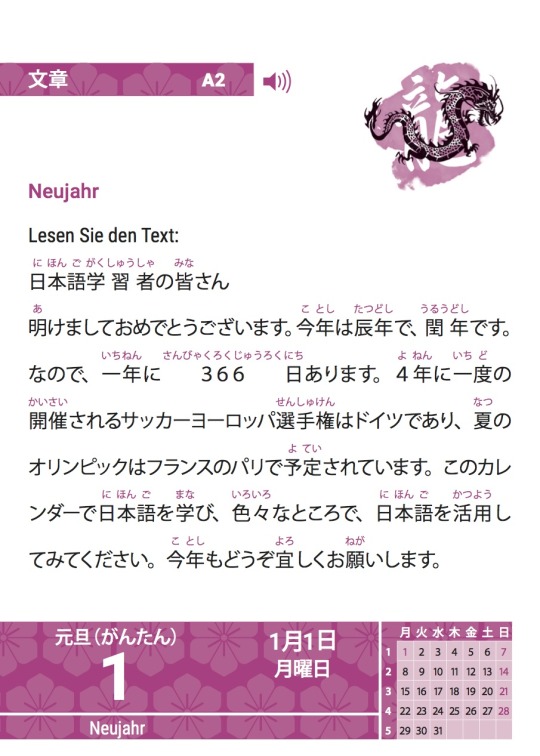
Vocab
辰年(たつどし)Year of the Dragon
閏年(うるうどし)leap year
開催する(かいさいする)to hold (an event); to host
選手権(せんしゅけん)Championships
予定する(よていする)to plan
活用する(かつようする)to utilize; to actively use
Translation
Dear Japanese learners,
Happy New Year! This year is the Year of the Dragon and a leap year. That's why there will be 366 days in the year. The European Football Championships that are held once every four years will be (taking place) in Germany, and the Summer Olympics are planned in Paris, France. Lean Japanese by using this calendar and try actively using it in various places. Please be kind to us again this year.
56 notes
·
View notes
Text
Now I’m all for the Peter Jackson aesthetic of the hobbits, but we must all agree that the english style clothing is getting boring? I mean these are hobbits we are talking about! I want clothing with lots of colour that reflects their personality and culture! I say we need to start depicting them in Romanian clothing. The coats are made from sheepskin, which is surely abundant in the shire with trade from the dwarves and so forth, and hobbits for sure do embroidery, weaving and leather work. I imagine their designs would be nature based, with vines, leaves blades of grass that are multi coloured like sunsets.
Every family would create their own family coat and embroider there family crest. Or they would have artisan guild throughout the shire, which I feel would be most prevalent in the north and east farthings. They would also make great trade with these waistcoats, using the extra wool and skins to trade with the dwarves from Ered Luin every summer when they come down to trade.
So yes, what I’m saying is I would love to see more colourful, culture enriched hobbits! I mean look at these waistcoats and tell me that a hobbit wouldn't wear these
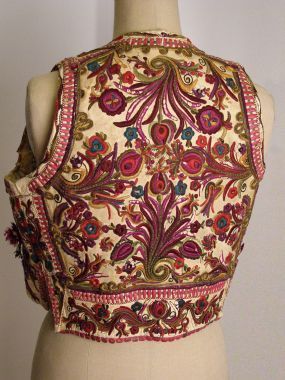
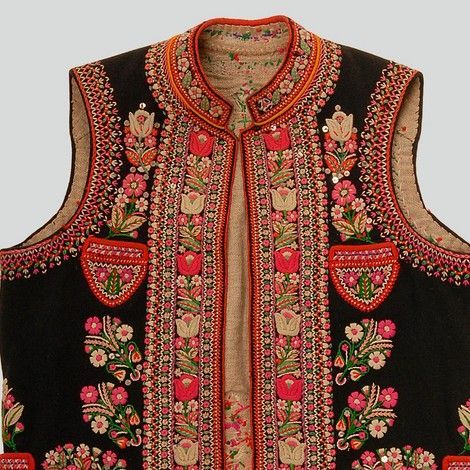
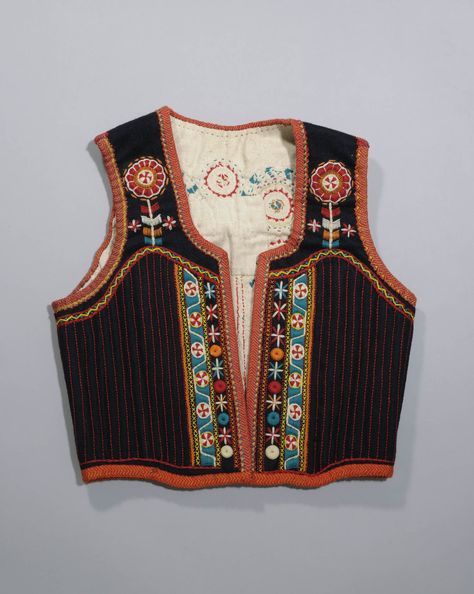
197 notes
·
View notes
Text
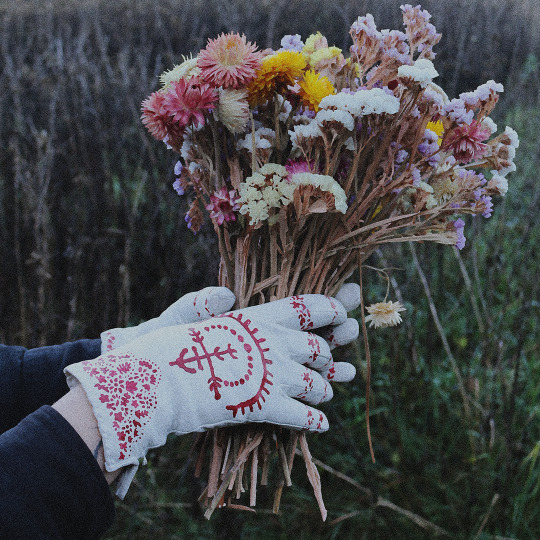
Hand painted second-hand leather gloves - inspired by old Slavic embroidery and traditional Balkan tattoos
#custom clothing#slavic#slavic culture#slavic folklore#slavic art#slavic witch#slavic paganism#pagan art
10K notes
·
View notes
Text

2K notes
·
View notes
Note
re: your comment about the misinterpretation and misuse of "tikkun olam" by non-Jews, could you please explain what it *does* mean? I've heard that it roughly translates to repairing the world (like with Rabbi Tarfon's "it is not your duty to finish the work, but neither are you at liberty to neglect it"), but idk if that's what it actually is or not (sorry if any phrasing is weird, i've been awake for way too long today)
Your understanding is correct.
It does mean repairing the world. This means doing charity and choosing kindness whenever possible and generally doing small and large things without recognition in order to leave the world better than you found it. Plant a tree. Read at a nursing home. Save all your loose change for ten years then donate that amount to a cause you care about. Make kindness that helps others heal a part of your daily practice. This is tikkun olam.
I have seen bigots who consider themselves progressive try to goysplain tikkun olam as Jews attempting to impose their idea of perfection on the world around them and that we use it to justify violence. I have seen people say that Jews consider the bombing of Gaza and Rafah to be the ideal practice of tikkun olam. And it is a blatantly and horrifically false and disingenuous to say this. Tikkun olam is my absolute favorite aspect of my faith. I wake up and choose kindness and peace every single day and have since I learned about this concept. It is not always easy, but it is always worth it.
And to see others pervert it into something violent and to associate that violence as synonymous with Jewish religious ideology is truly one of the most painful things I’ve experienced in this conflict and one of the most bigoted things I’ve experienced in my life.
578 notes
·
View notes
Note
I know you’ve probably writing about it before, but there is just something so lovely about a human not understanding alien courting customs and accidentally doing a lot of them to an alien, who is feeling like they are getting a lot of mixed signals from their human friend! Would that be a usable request? Love your writing!!!
OOOH anon I'm such a sucker for "accidentally doing something considered flirtatious by a different species toward a member of said species"
I feel like in the kind of modern sci-fi settings I use for my writing there's an extra level of awareness and drama, because while an alien surrounded by members of their own kind might assume you're coming onto them purposefully, your alien crewmate is very aware of the cultural differences that come with interspecies work. They know you're unaware of the courting methods of their species, much less the specific traditions of their people.
They wouldn't expect you to know that sort of information anyhow, so they're not offended when you offer to share from your canteen during a mission without realizing the intimate, personal implications of the gesture. How would you know? Humans share drinks all the time, they were thirsty. What kind of friend would you be if you didn't share?
You were right, of course. Water-sharing to you was just a kind gesture, there was no reason to deny your affection. Their mouth met where yours had been, and they feel so close to you they ache.
There are times they feel guilty. When you shut you eyes and stretch, casually letting the entire universe know that you trust them to protect you when your tired, or when you drape one of your blankets over the both of you while you watch a movie and they can smell you from all sides. There are times they want to tell you: This doesn't mean as little to me as it means to you. You're kissing me in my native tongue, y'know.
They know they shouldn't be indulging in the idea that you're acting on any kind of romantic interest, but they just can't bring themself to tell you. There was too much of a chance you would stop.
#plot twist you reveal you looked up your alien besties cultural romance customs to flirt more coherantly and they explode#alien x human#alien x reader#imagines#monster x human#alien imagines#humans and aliens#humans are weird#monster x reader#alien#monster boyfriend#sci-fi#sci fi and fantasy#sci fi romance#answered ask#monster girlfriend
574 notes
·
View notes
Text
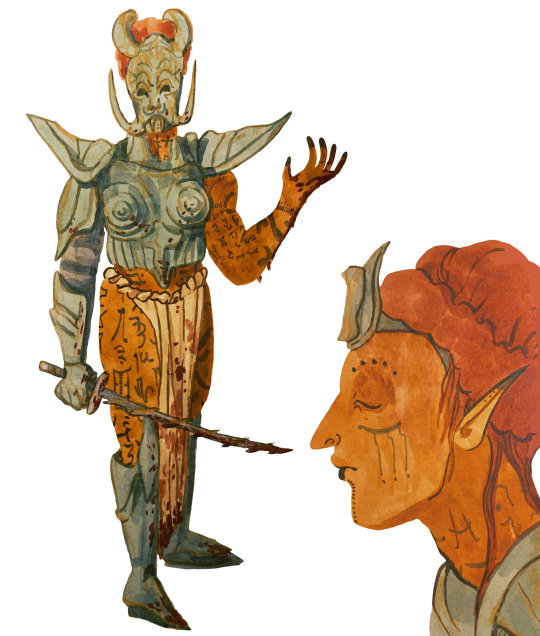
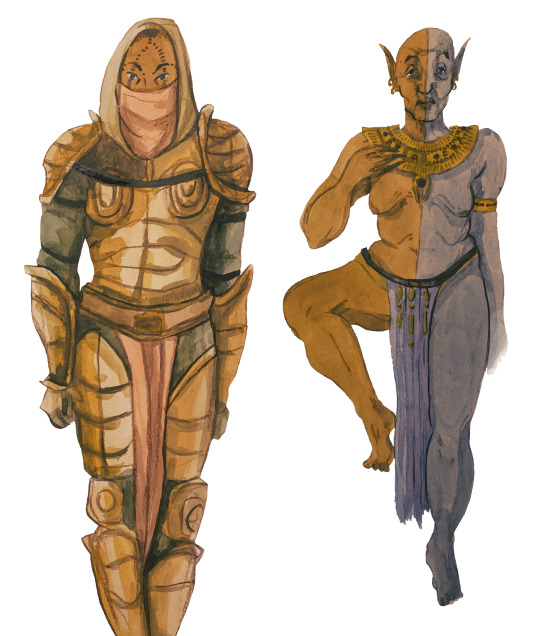
girlbossing too close to the sun.
#art#ive literally just been treating this game as a library simuator#i walk from bookseller to bookseller opening up all of their books#vivecs sermons are either a highlight or the point at which i stop reading#ive been trying to convince the ordinators that imitation is the highest form of flattery but it hasnt been working#let me wear your helmets please theyre so funny..#posting morrowind in 2024 isnt a cry for help but youre not wrong to be concerned.#morrowind#almalexia#vivec#im going to explain the chitin armor give me a moment#so the bonewalker nerevar on the shrines is adorable and it was only after drawing it however many times that i realized#it looked relatively close to a modified chitin armor#and so i modified chitin armor a few times and this was probably the cutest result#i also know i drew almalexia relatively pristine and untouched by years and vivec not so much but my thought process was#vivecs role as if not a favorite then the most accessible divine or the most “hands on” in a manner of speaking#acting in ways visible to the general population or actions explicitly brought to their attention#like not that almalexia isnt doing anything she is#but the dissemination of information regarding that is very different etc etc etc#anyways to a certain extent a god is the face on a shrine or in art or upon a statue or carving#but vivecs presence is interwoven with the geography of vvardenfell especially and his actions and writings with pubished materials#and the arts and culture and customs etc etc etc#so to me the face of a god you know and feel a commonality with or a god that walks alongside you is a face you would recognize#and vivec is already otherworldly looking enough#the simple mark of the years on his skin in some way grounding him in reality felt more right#that and i think the ways in which he and almalexia care about outward appearance are slightly different- they prioritize different things#and the ways they present outward power and their embodiment of their respective attributes share some similarities as they both have that#important preoccupation with physical power and physical strength to a certain degree#oh my god nobody read this i am yapping so bad.#tes
540 notes
·
View notes
Note
Which is your favorite platform? (of the ones you have accounts to post things I mean. I can't imagine it being Instagram since you don't really post there which honestly fair)
Tumblr, Twitter (X?) bluesky? Something else?
I think I'm going to have to go with tumblr, and it's not just because we're here. Twitter and Bluesky are nice and my experiences on both are overwhelmingly positive. But tumblr has an atmosphere that encourages originality, sharing your creations and talking about things in depth.
#I dislike the mindset of making “content” and when I'm posting here I don't feel like I have to tailor my posts to be#as easily consumable by as many people as possible#microblogging platforms are fast paced and you're constantly fighting the algorithm#making long text posts is inconvenient and usually not worth the trouble#so I rarely talk about my characters or their lore outside of tumblr#what's nice is that when you ramble about your personal projects and fictional fixations here people tend to be pretty receptive to it#like they Get These Feelings and are able to analyze and read between the lines really well at least if you ask me#on top of that customizing your browsing experience and curating an organized blog is easier#and above everything I love and cherish tumblr's tag culture#very often the best commentary I get comes from tags#answered#anonymous#instagram continues to give me bad vibes and going there has always felt like a chore
188 notes
·
View notes
Text
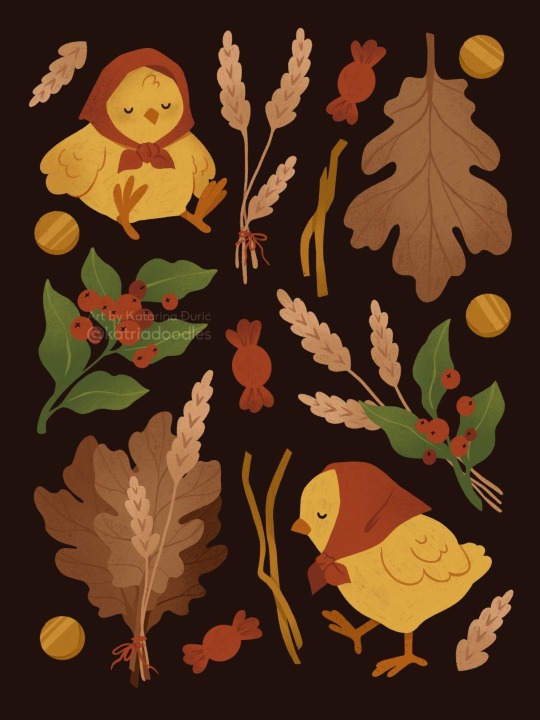
wishing happy holidays to everyone who’s celebrating and equally cozy and snuggly time to those who aren’t 🐥
#I’m not religious but my family is Orthodox Christian so we celebrate Christmas on Jan 7th!#this illo represents one of my favorite customs ever#my art#artists on tumblr#slavic culture#slavic art#digital art#cute art#artists of tumblr#eastern europe
2K notes
·
View notes
Text
[Running Commentary] Zombies are Zombies: Cultural Relativism, Folklore, and Foreign Perspectives
She obviously started getting into media in Japan, and (from my research into Japanese media and culture), Japan’s movies about zombies are mostly comedic, since due to traditional funerary practices the idea of zombies bringing down society is ridiculous to a lot of Japanese people.
Rina: OP, this you? https://www.tofugu.com/japan/japanese-zombies/
Marika: Counterpoint: Parasite Eve. Resident Evil. The Evil Within.
Rina: Literally all the grody horror game franchises that people forget were developed and written by Japanese people because the characters have names like “Leon Kennedy” and “Sebastian Castellanos”
~ ~ ~
Based on the reception we received the last time we did one of these, the Japanese moderator team returns with another running commentary. (They’re easier to answer this way) (Several of Marika’s answers may be troll answers)
Our question today pertains to foreign perspectives on folklore—that is, how people view folklore and stories that aren’t a part of their culture. CW: for anything you’d associate with zombies and a zombie apocalypse, really.
Keep reading for necromancy, horror games, debunking the Sapir-Whorf hypothesis, Hong Kong jiangshi films, Japanese disaster prep videos, and Vietnamese idol pop...
Essentially, in my story there’s an organization who wants to end the world. They think this one woman in particular, a woman of mixed Vietnamese (irreligious, Kinh) and Japanese descent who spent her formative years in Japan, is the person to do it because she’s (for lack of a better term) a necromancer; powers are semi-normal in this world. She prefers not to use her powers overall, but when she does she mostly talks to ghosts and spirits that are giving people issues. She could technically reanimate a corpse but she wouldn’t because she feels that would be morally wrong, not to mention she couldn’t start a zombie apocalypse in the traditional sense (plague, virus, etc.) in the first place.
(Marika (M): Your local public health officials would like to assure necromancers that reviving the dead will not provoke a zombie apocalypse. This is because necromancy is a reanimation technique, and not a pathogenic vector. Assuming that the technique does not release spores, airborne viruses, gasses, or other related physical matter that can affect neighboring corpses in a similar way, there should be no issue. However, necromancers should comply with local regulations w/r to permitting and only raise the dead with the approval of the local municipality and surviving family.)
M: I think it makes sense for most people of E. Asian descent, including Japanese and Vietnamese people, to find it culturally reprehensible to reanimate the dead. I imagine the religious background of your character matters as well. What religion(s) are her family members from? How do they each regard death and the treatment of human remains? Depending on where she grew up, I’m curious on how she got opportunities to practice outside specialized settings like morgues.
M: It’s true, space in Japan is at a premium, even for the dead. You note that most of Japan cremates, but, surely, it must have occurred to you that if there aren’t that many bodies in Japan to raise…she doesn’t exactly have much opportunity to practice with her powers, does she? I yield to our Vietnamese followers on funerary customs in Vietnam, but you may want to better flesh out your world-building logic on how necromancy operates in your story (And maybe distinguish between necromancy v. channeling v. summoning v. exorcisms).
She obviously started getting into media in Japan, and (from my research into Japanese media and culture), Japan’s movies about zombies are mostly comedic, since due to traditional funerary practices the idea of zombies bringing down society is ridiculous to a lot of Japanese people.
Rina (R): OP, this you? https://www.tofugu.com/japan/japanese-zombies/
M: Counterpoint: Parasite Eve. Resident Evil. The Evil Within.
R: Literally all the grody horror game franchises that people forget were developed and written by Japanese people because the characters have names like “Leon Kennedy” and “Sebastian Castellanos”
R: And yes, the Tofugu article uses Resident Evil and those games to support its theory, with the reason that they are set in the West. But that only suggests that Japanese people consider zombies a Western thing, not that Japanese people consider zombies nonthreatening if they were to exist.
M: Same with vampires - series like Castlevania also use Western/ European settings and not “Vampires in Japan '' because vampires just aren't part of our folklore.
(M: Also, realistically, these series deal with individuals who quickly perish after their bodies are used as hosts for the pathogen in question, rather than the pathogen reanimating a corpse. Although the victims are initially alive, they soon succumb to the pathogen/ parasite and their organic matter then becomes an infectious vector for the disease. It should be noted, infecting ordinary, living humans with viruses to grant them elevated powers, is not only a major violation of consent and defies all recommendations made by the Belmont Report (in addition to a number of articles in the Hague Convention w/r to the use of WMDs) and is unlikely to be approved by any reputable university’s IRB committee. This is why the Umbrella Corporation are naughty, naughty little children, and honestly, someone should have assassinated Wesker for the grant money.)
R: wwww
From what I know Vietnam didn’t have a zombie movie until 2022.
R: Do you mean a domestically produced zombie movie? Because Vietnamese people have most certainly had access to zombie movies for a long time. The Hong Kong film Mr. Vampire (1985) was a gigantic hit in Southeast Asia; you can find a gazillion copies of this movie online with Viet subs, with people commenting on how nostalgic this movie is or how they loved it as a kid.
M: “Didn’t have a [domestic] zombie movie” is not necessarily the same thing as “Would not have made one if the opportunity had arisen.” None of us here are personifications of the Vietnamese film industry, I think it’s safe to say we couldn’t know. Correlation is not causation. It’s important to do your research thoroughly, and not use minor facts to craft a narrative based on your own assumptions.
(R: …Also, I did find a 2017 music video for “Game Over” by the Vietnamese idol Thanh Duy which features… a zombie apocalypse.)
youtube
(R: The MV has a very campy horror aesthetic and zombie backup dancers (which I love, everyone please watch this lol). But the scenes at the beginning and end where people are biting their fingers watching a threatening news report clearly establish that the zombies are considered a threat.)
So at one point, she laughs about the idea and remarks how ridiculous it is to think zombies could end the world. What I’m struggling with are other ways to show her attitude on the issue because I’d assume most non-Japanese readers wouldn’t get why she thinks like that. Are there any other ways to show why she thinks this way, especially ones that might resonate more with a Japanese reader?
R: The problem is this does not resonate in the first place. Your line of thinking is too Sapir-Whorf-adjacent. The Sapir-Whorf hypothesis, otherwise known as linguistic relativity theory, claims that language shapes cognition—that you can’t conceive of something if you can’t express it in your language. This is a very weak theory that you can easily bring evidence against: think of the last time you felt an emotion you had a hard time putting into words; just because you didn’t have the language for it doesn’t mean that you didn’t feel it, nor does it mean that you won’t be able to understand or recognize it if you feel it again. Similarly, it’s not a sound assumption to say that if some kind of subject matter does not exist in a culture, then people of that culture couldn't possibly conceive of it. This excerpt from linguist Laura Bailey sums it up quite well.
M: Just because ghosts may be more culturally relevant doesn’t mean that zombies (or vampires, or whatever) are nonexistent in a Japanese or Vietnamese person’s imagination when it comes to horror and disaster.
R: Really, if anything, Japanese people are much more attuned to how easily a society’s infrastructure can be destroyed by a disruptive force without adequate preparation. Japan is natural disaster central. A Japanese person would know better than anyone that if you aren’t prepared for a zombie epidemic—yeah it’s gonna be bad.
M: Earthquakes, tsunami, typhoon, floods: Japan has robust disaster infrastructure out of necessity. 防災 or bousai, meaning disaster preparedness is a common part of daily life, including drills at workplaces, schools, and community organizations. Local government and community agencies are always looking for ways to make disaster and pandemic preparedness relevant to the public.
M: Might “zombie apocalypse prep as a proxy for disaster prep” be humorous in an ironic, self-deprecating way? Sure, but it’s not like Japanese people are innately different from non-Japanese people. Rather, by being a relatively well-off country practiced at disaster preparation with more experience than most parts of the world with many different types of disasters (and the accompanying infrastructure), it likely would seem more odd to most Japanese people within Japan to not handle a zombie apocalypse rather like might one handle a combination of a WMD/ chemical disaster+pandemic+civil unrest (all of which at least some part of Japan has experienced). Enjoy this very long, slightly dry video on COVID-19 safety procedures and preparedness using the framing device of surviving a zombie apocalypse.
youtube
M: Living in Los Angeles, I’ve often experienced similar tactics. We do a fair amount of advance and rehearsed disaster prep here as well. In elementary school, the first and last days of class were always for packing and unpacking home-made disaster packs, and “zombie apocalypse” simulations have been around since I was in middle school for all kinds of drills, including active shooter drills, like the one shown in this LAT article. The line between “prepper” and “well prepared” really comes down to degree of anxiety and zeal. So, it wouldn’t be just Japanese people who might not be able to resonate with your scene. The same could be said for anyone who lives somewhere with a robust disaster prevention culture.
M: A zombie apocalypse is not “real” in the sense of being a tangible threat that the majority of the world lives in fear of waking up to (At least, for the mental health of most people, I hope so). Rather, zombie apocalypse narratives are compelling to people because of the feelings of vague, existential dread they provoke: of isolation, paranoia, dwindling resources, and a definite end to everything familiar. I encourage you to stop thinking of the way Japanese people and non-Japanese people think about vague, existential dread as incomprehensible to each other. What would you think about zombies if they actually had a chance of existing in your world? That’s probably how most Japanese people would feel about them, too.
#Youtube#asks#japanese#vietnamese#cultural differences#cultural relativism#linguistic relativity#zombies#sci fi#science fiction#necromancy#death#funerary customs#funeral#ghosts#vampires#folklore#natural disasters#disaster preparedness#rina says stan thanh duy#writeblr
232 notes
·
View notes
Text
11.02.24 建国記念の日(けんこくきねんのひ)National Foundation Day

Translation
The Founding of Japan
In Japan, there are no history books that were written before the 8th century. The oldest history book "Kojiki" came into existence in 712. The first emperor to make an appearance in it, Emperor Jinmu, is said to have assumed the throne in 660 BC. However, between "Kojiki" and the Ascension to the throne of Emperor Jinmu there is a time span of over 1.100 years, which cannot be accepted as historical fact. Before the [Second World] War, this day was called ”Kigensetsu" and was celebrated as the Foundation Day of Japan. After the war, it was temporarily abolished, but it was established once again as a national holiday in 1966 as a day to celebrate the founding of Japan.
Vocab
建国(けんこく)founding of a nation
成立する(せいりつする)to come into existence/effect
最古の(さいこの)the oldest
古事記(こじき)Kojiki, the earliest historical record of Japan, a collection of myths concerning the origin of the four home islands of Japan.
登場する(とうじょうする)to make an appearance; to come into the picture; to emerge
神武天皇(じんむてんのう)Emperor Jinmu
紀元前(きげん全)BCE; Before Common Era
即位する(そくいする)to ascend/assume the throne
史実(しじつ)historical fact
認める(みとめる)to accept; to recognize
廃止する(はいしする)to abolish; to discontinue
再び(ふたたび)once again/more
制定する(せいていする)to establish
25 notes
·
View notes
Text
[Traditional Chinese Festival] Customs of 臘八節(Laba Festival) in China.Eng Sub
Today(January 18, 2024) is the traditional Chinese festival,臘八節 Laba Festival.Let’s learn about some interesting traditions and customs about this festival.
【About 臘八節(Laba Festival)】
Laba Festival (Chinese:臘八節) is a traditional Chinese holiday celebrated on the eighth day of the month of La (or Layue 臘月), the twelfth month of the Chinese calendar. It is the beginning of the Chinese New Year period. It is customary on this day to eat Laba congee.
Laba Festival was not on a fixed day until the Southern and Northern dynasties, when it was influenced by Buddhism and was fixed on the eighth day of twelfth month, which was also the enlightenment day of the Buddha. Therefore, many customs of the Laba Festival are related to Buddhism.
The Laba Festival's name represents its date on the Chinese calendar. La is the name of the twelfth and final month, and ba means "eight/八". In ancient China, the "eight/八" referred to making sacrifices to eight gods at the end of the year.
In its original form, the festival was celebrated by making sacrifices to gods and ancestors to wish for good fortune, health, safety, and a good harvest in the new year. The word la originally referred to these sacrifices.
After Buddhism spread to China during the first century CE, the festival was used as commemoration of Gautama Buddha's enlightenment.It was given a fixed date (the eighth day of the twelfth month) during the Northern and Southern dynasties.
【Customs of 臘八節/Laba Festival?】
Laba congee/臘八粥
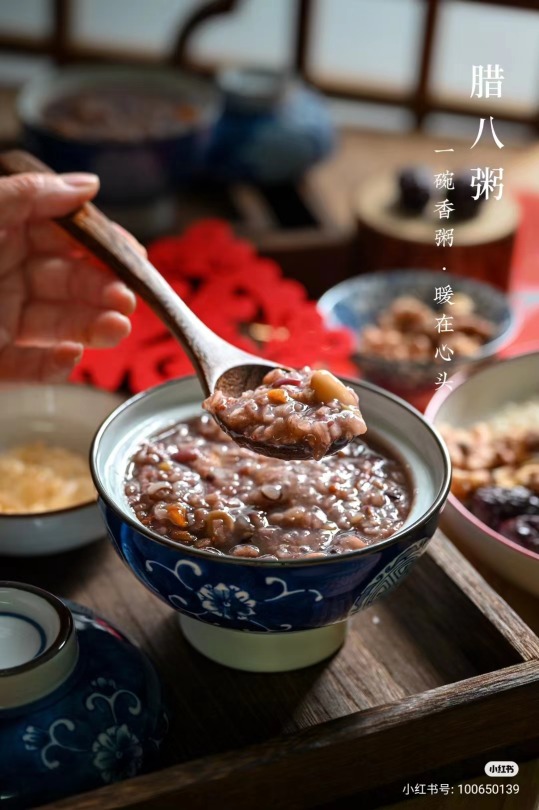
Traditionally, the consumption of Laba congee is an important element of the festival. There are multiple legendary accounts of the dish's origins. One story says that it originated in the Song dynasty with Buddhist monasteries giving congee to people in honor of the story that Sakyamuni (Gautama Buddha) reached enlightenment on the eighth day of the twelfth month after eating congee.
Laba congee or Laba porridge (臘八粥; Làbāzhōu) is very popular in many places in China. Different kinds of rice, beans, nuts and dried fruits are the main ingredients. People believe that it's good for health in the winter.
It is also known as "eight-treasure congee" (八宝粥; Bā bǎo zhōu)and is usually made with eight or more ingredients, representing good luck. Eight is a lucky number in China, and the ba in Laba also means eight.
There are many variations of Laba congee in different regions of China. Ingredients can include mixed grains, such as rice, millet, and barley; beans and nuts such as mung beans, azuki beans, lotus seeds, peanuts, walnuts, and chestnuts; dried fruit such as red dates, longan, raisins, and goji berries; and other ingredients such as vegetables and meat.
2.Laba garlic/臘八蒜

Another Laba food is Laba garlic, which is particularly popular in northern China.Garlic in Chinese (蒜; suàn) has the same pronunciation as calculate (算; suàn), and it is said that on the Laba Festival businesses should balance their books and calculate their revenues and expenditures for the year.Laba garlic is made by soaking garlic in vinegar. Laba garlic is soaked in vinegar from the Laba Festival until Chinese New Year. The garlic and vinegar are then used alongside Chinese dumplings (jiaozi) around Chinese New Year.
————————
🧚🏻Model/Makeup:@曾嚼子&@兔狲猫眠眠
📸 Photo:@逸群闲余
🔗 Xiaohongshu:http://xhslink.com/zlF8Hz
————————
#chinese hanfu#hanfu#Traditional Chinese Festival#臘八節 Laba Festival#chinese culture#chinese customs#chinese history#hanfu accessories#chinese food#china#chinese new year#song dynasty
197 notes
·
View notes
Text
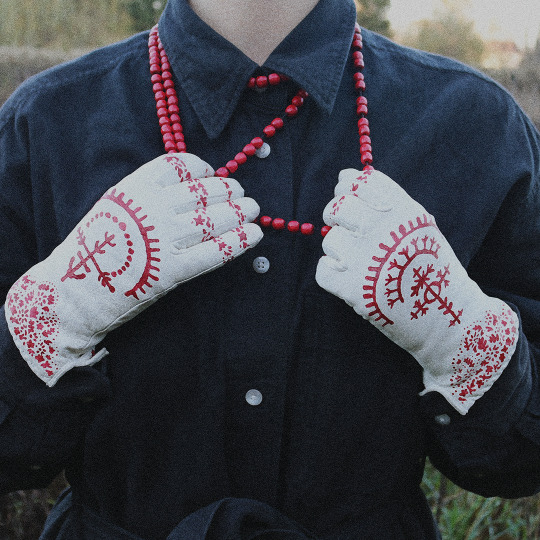
Hand painted second-hand leather gloves - inspired by old Slavic embroidery and traditional Balkan tattoos
3K notes
·
View notes
Text
desperately need people to understand that alicent is a victim but she’s also an abuser and a perpetrator
that she actively makes choices to harm other women because of jealousy and envy and the greed deep in her bones because submitting to suffering didn’t get her what those women fight to grasp for themselves.
she is absolutely a victim, in show.
that doesn’t change that she abused rhaenyra and her children, her own son, most likely helaena given how she flinches every time her mother touches her, and is actively weaponizing the patriarchy of westeros against other women- rhaenyra primarily, but also mysaria and dyana.
she isn’t the moral, righteous force of good that even she thinks she is, she’s a wounded woman directing all of the rot, pain, and fury inside her at the wrong people and forces.
#anti team green stans#anti team green#anti alicent hightower stans#i don’t wanna say it’s anti alicent bc honestly it’s more ‘accept her for who she is bc she’s so much more complex and interesting when you#but i made this bc someone genuinely tried to say that the reason people hate her is that they don’t see her as a victim#most rational people know show!alicent is a victim#it’s the point that’s she’s an abuser as well#that makes them dislike her#that she’s a hypocrite and a traitor#i don’t even like young alicent bc i don’t at all think she was a good friend to rhaenyra#‘it’s not your place to question the plots of lords and men’ to the named heir#dismisses rhaenyra’s hopes and idealism entirely out of hand#is baffled that rhaenyra is more worried for her fathers happiness and mother’s wellbeing than her position#she knew as early as ep 3 that otto was conspiring against rhaenyra and never told anyone#condemns ‘targaryen customs’ only to wed her daughter to her son even younger than she was when otto dangled her before viserys#acts entitled to rhaenyras secrets whilst condemning and judgemental even though she did not give rhaenyra that same courtesy#made no attempt at apology for the insensitive comment of aegon’s birth#though rhaenyra DID try to apologize for the ‘imprisoned in a castle’ line and tried to comfort her#uses her power as queen to push past the space rhaenyra is trying to create because she feels heartbroken and betrayed#rhaenyra took part in alicent’s culture with prayer at alicent’s urging because she cared about alicent and alicent was trying to help her#alicent is never once shown to return that favor instead condemning it for ‘queerness’ and growing to later#erase and remove all targaryen and valyrian heraldry from the red keep to replace with her own#like alicent is a victim and i DO have empathy for her. but i don’t like her and never will#especially not after the way her stans behave#she deserved better than otto’s machinations and viserys’…. viserysness#but that can also be true whilst i condemn her actions and behaviors
85 notes
·
View notes
Text
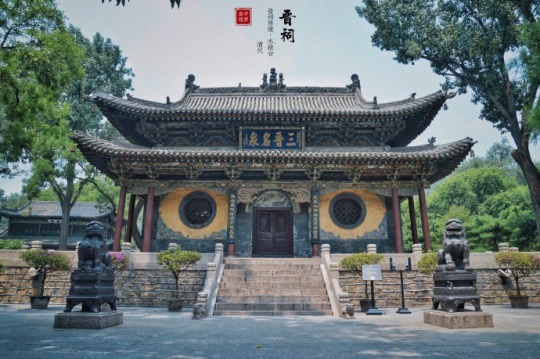
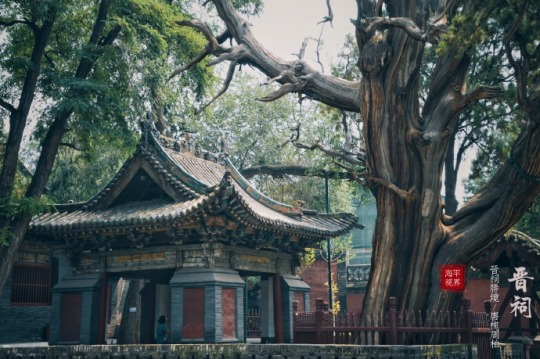
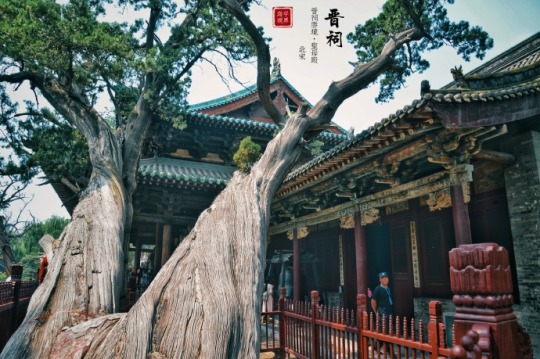
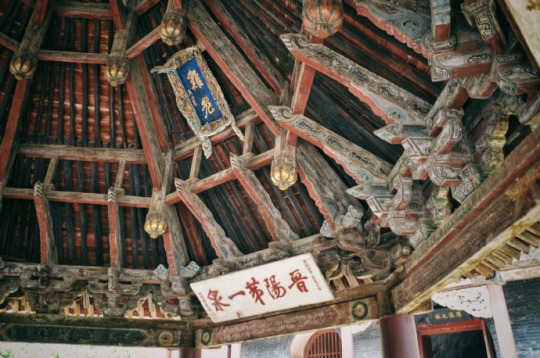
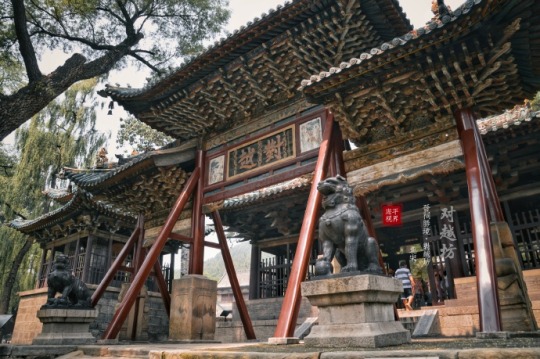
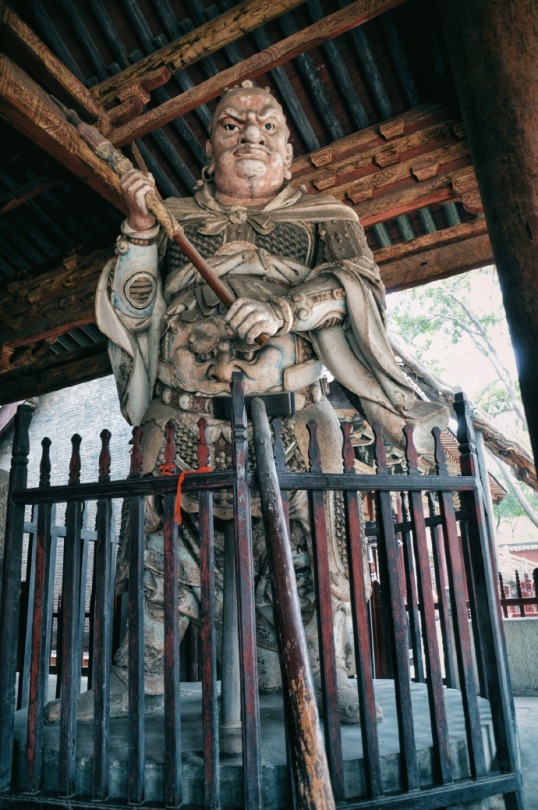
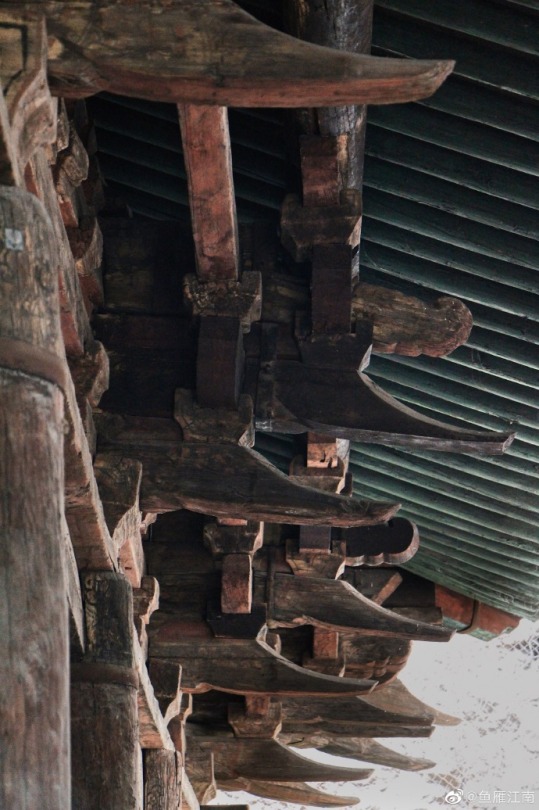

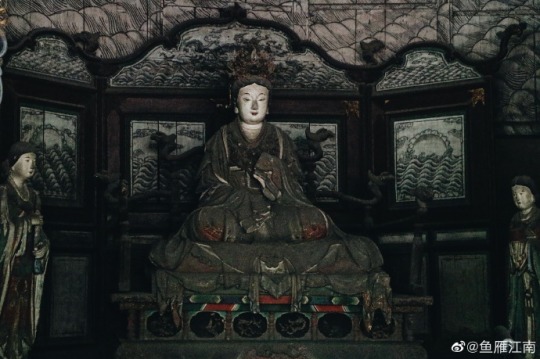
The Hall of the Holy Mother: One of the Oldest Places of Worship
The Hall of the Holy Mother (聖母殿) in Jinci Temple (晉祠), Shanxi. Built during the reign of Emperor Renzong (仁宗) of the Northern Song dynasty (1023-1032).
The hall is part of the ever evolving temple complex founded about one and a half thousand years ago. Over the centuries of countless transformations, it has accumulated buildings of various periods and styles.
The temple is dedicated to Shuimu (水母), The Old Mother of Waters, witch-goddess of Chinese lore, appearing in the form of a dragon, a snake or a charming lady with a sword and a yoke.
Photo: ©鱼雁江南, 雪夜魚舟
#ancient china#chinese culture#chinese mythology#taoism#chinese architecture#song dynasty#wooden architecture#wooden buildings#chinese customs#taoist#chinese folk religion#chinese temple#religious art#temple architecture#taoist deities#goddess#goddess worship#mother goddess#great mother#chinese folklore#dragon art#dragon
264 notes
·
View notes
Text

CRAZY CAR ART ”Z33 (350Z)”
Drawn by order of ian
Thank you so much!
For drawing inquiries, please send me message.
絵のご依頼はメッセージにてお気軽にお問い合わせください。
My web shops are here.
https://ozizo-z.wixsite.com/ozizo/shop
mame mame rock / (c)ozizo
#z33#350z#nissan#fairlady z#datsun#japanesecar#custom culture#automotive art#car art#cartoon#illustration#artwork#mame mame rock#ozizo#オジゾー#Crazy Car Art
88 notes
·
View notes